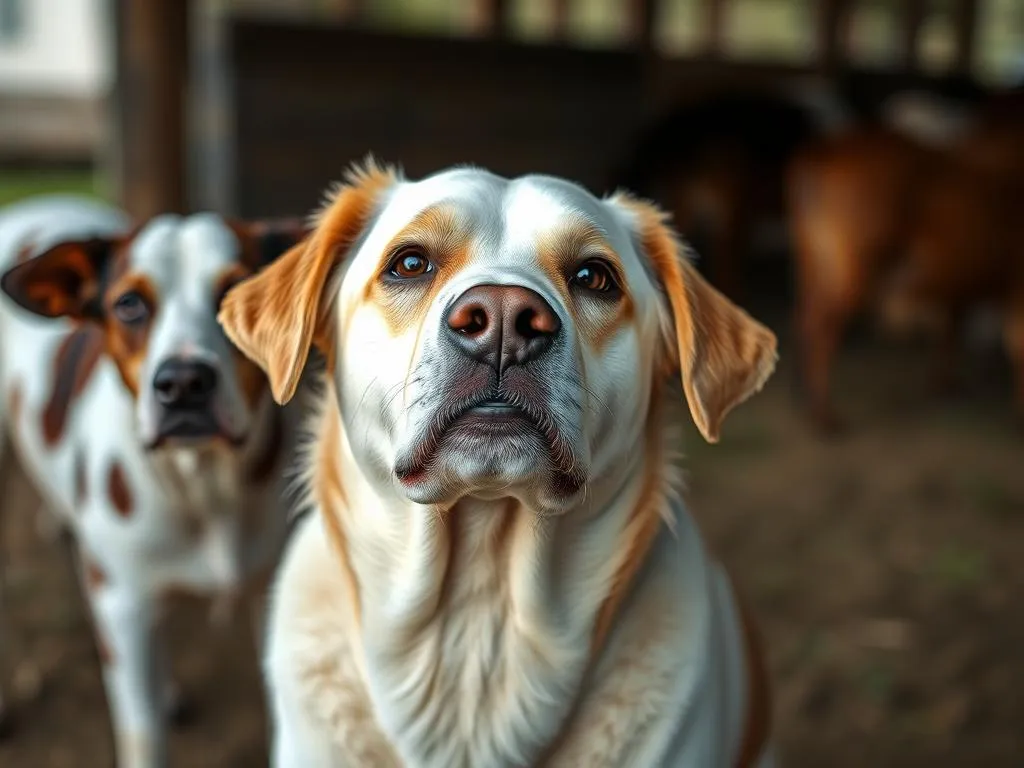
Dogs have been invaluable companions and workers on farms for centuries. Their roles range from herding livestock to providing companionship to farmers and guarding property. The right best farm dogs can significantly enhance farm productivity and create a harmonious environment. Understanding what makes a dog suitable for farm life is essential in selecting the perfect breed for your specific needs.
Understanding Farm Dogs
Role of Dogs on Farms
Farm dogs play several crucial roles:
- Herding Livestock: Many dogs are bred specifically to herd animals like sheep, cattle, and goats, helping farmers manage their herds effectively.
- Guarding Property and Livestock: Farm dogs protect against predators and intruders, ensuring the safety of both the livestock and the farmstead.
- Companionship for Farmers and Other Workers: They provide emotional support and companionship, making long hours on the farm more enjoyable.
Characteristics of Ideal Farm Dogs
When selecting a farm dog, consider the following characteristics:
- Temperament: Ideal farm dogs are loyal, intelligent, and trainable. They should have a calm demeanor yet be ready to spring into action when needed.
- Physical Attributes: Dogs suitable for farm life typically have a sturdy build, good endurance, and the ability to navigate various terrains.
- Energy Levels and Exercise Needs: A dog with high energy levels is often preferred, as they require regular physical activity to stay healthy and happy.
Top Dog Breeds for Farming
Herding Breeds
Border Collie
The Border Collie is renowned for its herding abilities and intelligence. They excel in managing livestock and can quickly learn commands. Their keen instincts and agility allow them to navigate complex farm environments effectively.
- Ideal Activities on a Farm: Herding sheep, cattle, and performing agility exercises.
Australian Shepherd
Australian Shepherds are versatile and energetic dogs, making them suitable for various farm tasks. They are known for their herding skills and adaptability to different environments.
- Training Tips: Begin training early and use positive reinforcement techniques to encourage good behavior.
Belgian Malinois
The Belgian Malinois is another exceptional herding dog. They are strong, intelligent, and highly trainable, making them suitable for both herding and protection tasks.
- Strengths and Weaknesses: While they are highly effective herders, they can be more demanding in terms of exercise and mental stimulation compared to other breeds.
Guard Dogs
Anatolian Shepherd
The Anatolian Shepherd is a powerful and protective breed, ideal for guarding livestock. They possess strong instincts to protect their territory and are known for their loyalty.
- Best Practices for Training and Socialization: Early socialization is crucial to ensure they are well-adjusted and can distinguish between threats and non-threats.
Great Pyrenees
Great Pyrenees are gentle giants known for their calm demeanor. They are excellent livestock guardians, providing a protective presence without being overly aggressive.
- Environmental Adaptations: Their thick coat allows them to thrive in various climates, making them well-suited for outdoor living.
Rottweiler
The Rottweiler is a versatile breed that can serve as both a guard dog and a farm companion. They are confident, protective, and highly trainable.
- Training Considerations: Early training and socialization are essential to ensure they are well-behaved around livestock and people.
Working Breeds
Labrador Retriever
Labrador Retrievers are adaptable and friendly dogs that can assist with various farm tasks beyond herding. They are known for their intelligence and eagerness to please, making them easy to train.
- Socialization and Temperament: Early socialization is vital to ensure they get along with other animals and people on the farm.
German Shepherd
The German Shepherd is a highly versatile working dog. They are known for their strength, intelligence, and loyalty, making them excellent for various farm tasks.
- Importance of Training and Exercise: Regular training and physical activity are necessary to keep them mentally and physically stimulated.
Boxer
Boxers are energetic and playful dogs with a friendly disposition. They can adapt well to farm life, providing companionship while also being capable of assisting with various tasks.
- Energy Management and Training Tips: Regular exercise is important to keep them happy and well-behaved.
Choosing the Right Farm Dog
Assessing Your Farm’s Needs
Before selecting a dog, assess the specific needs of your farm:
- Types of Livestock and Tasks: Consider the type of animals you have and what tasks you need help with, whether it’s herding, guarding, or companionship.
- Size of the Farm and Working Environment: Larger farms may require more robust breeds capable of covering more ground.
Lifestyle Considerations
It’s essential to consider your lifestyle when choosing a farm dog:
- Time Commitment for Training and Care: Assess how much time you can dedicate to training and caring for your dog.
- Compatibility with Existing Animals and Family Members: Ensure that the breed you choose will get along with your existing pets and fit well within your family dynamics.
Age and Training Level
Deciding on the age of the dog is a significant consideration:
- Pros and Cons of Adopting Puppies vs. Adult Dogs: Puppies may require more training and socialization, while adult dogs may already have established skills.
- Importance of Training and Socialization from an Early Age: Early training is critical for developing good behavior and adaptability to farm life.
Caring for Your Farm Dog
Health and Nutrition
Proper care is essential for the well-being of your farm dog:
- Overview of Dietary Needs Based on Breed and Work Level: Consult with your veterinarian to create a diet that supports your dog’s energy and health needs.
- Regular Veterinary Care and Vaccinations: Ensure your dog receives routine check-ups and vaccinations to maintain their health.
Training and Socialization
Training is crucial for a well-behaved farm dog:
- Key Training Techniques for Farm Dogs: Use positive reinforcement, consistency, and patience to train your dog effectively.
- Importance of Socialization with Livestock and Other Animals: Introducing your dog to various animals early on will help them learn appropriate behaviors and reduce the likelihood of issues.
Exercise and Mental Stimulation
Farm dogs require regular physical and mental exercise:
- Daily Exercise Routines Suitable for Farm Dogs: Incorporate walks, playtime, and herding exercises into their daily routine.
- Activities to Keep Dogs Mentally Engaged: Puzzle toys, training games, and interactive activities can help keep your dog mentally stimulated.
Common Challenges and Solutions
Behavioral Issues
Farm dogs may encounter behavioral challenges:
- Overview of Potential Behavioral Problems: Common issues include aggression towards livestock, excessive barking, or anxiety.
- Strategies for Addressing These Issues: Consistent training, socialization, and providing a structured environment can help mitigate behavioral problems.
Safety Concerns
Keeping your dog safe on the farm is vital:
- Keeping Dogs Safe Around Machinery and Livestock: Supervise your dog when machinery is in use and ensure they are trained to be calm around livestock.
- First Aid Tips for Common Injuries: Familiarize yourself with basic first aid for dogs to address minor injuries promptly.
Conclusion
Choosing the right breed for your farm is essential for ensuring a productive and enjoyable environment. Each breed has unique characteristics that can benefit your specific farm needs. By carefully considering your farm’s requirements and the traits of various breeds, you can find the best farm dog to support you in your agricultural endeavors.









